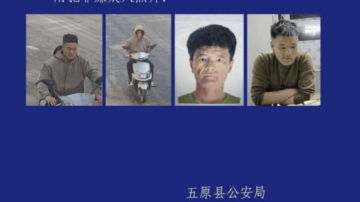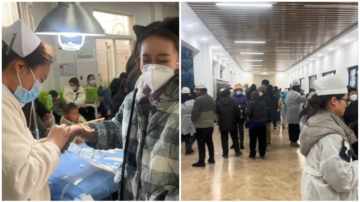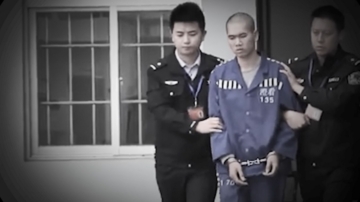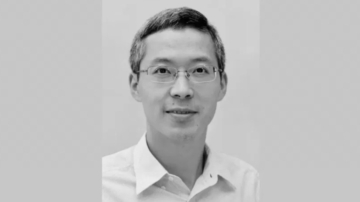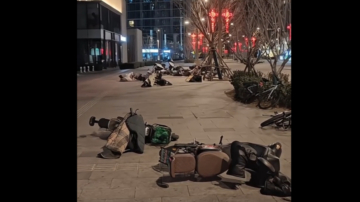【新唐人2013年09月02日讯】在过去几个月,北京一个独立电影学校被当局关闭,两个独立电影节被取消,当局还恐吓组织者。分析人士指出,对独立电影人的打压,对自由文化的管制,是中共最近加紧控制舆论的又一例证。请看报导。
第十届北京独立影像展8月23号在北京东郊宋庄开幕,但是当天就被当局叫停。
《美联社》8月30号发自北京的报导说,北京独立影像展创始人之一王宏伟表示,北京当局出动警察到第十届北京独立影像展开幕式现场,并勒令立即停止活动。
之后,主办方不得不更换地点和节目安排,才得以继续举行。
香港作家张成觉表示,列宁曾说“在所有的艺术中,电影对我们是最重要的”。延续苏联传统的中共把电影也要牢牢控制在自己手中。
香港作家张成觉:“普通人拍电影,它表达的想法或者说要传达的信息五花八门、百花齐放,中共就完全没有办法去控制。因此,当局对这个事情一定是严加控制。”
张成觉指出,中国大陆的独立制片发展很快,在国际电影节上也越来越受到注意,而且得奖的也不少。
毕业于《北京电影学院》的北京独立电影导演范坡坡,他参与制作的记录片《兄弟》也是这次北京独立影像展的参展影片之一。他在30号晚间接受《自由亚洲电台》采访时表示,现在中国独立电影圈流行这样的说法:“在中国独立电影节有两种死亡方式供选择,一是自杀,二是他杀。”
宋庄诗人王藏:“这是他们一贯的残酷邪恶方式,就是不允许独立自由精神的存在,用一切手段来压制民间的对这方面自由文化在做出的努力想用他们的党文化这个铁棒来一统天下。”
据报导,今年3月的第六届“云之南”记录影像展被当局取消,已经赶至大理的独立影视人被告知,不得参与任何组织影视活动。
去年11月,在南京东郊举行的独立电影节也遭到政府打压,一些原本出资赞助电影节的投资者,在中共当局的压力下,纷纷撤资。
除了各种民间电影节受到当局打压之外,上个月警方还下令关闭中国唯一的一所独立电影学校——“北京栗宪庭电影学校”,并指控这个学校“宣传反社会思想”。
美国纽约城市大学政治系教授夏明曾经参与“512汶川大地震的记录片——《劫后天府泪纵横》的拍摄工作。夏明教授表示,中国独立电影界在过去几个月遭到当局不同程度的打压,这是当局加大对言论自由钳制的又一例证。
国际人权组织“人权观察”近日发表报告称,自今年2月以来,中共已拘押55名维权人士,抓捕了一些着名网上异议人士,包括正被刑拘的北京知名法学家许志永、广东知名维权人士郭飞雄、独立制片人杜斌等。
从8月20号以来,中共又开展所谓打击网路“谣言”的专项行动,北京的“秦火火”、“薛蛮子”、“立二拆四”、周禄宝、傅学胜等多位元微博红人、网路大V相继被捕。中共当局要求互联网遵守“七条底线”,发表言论不得越线。
宋庄诗人王藏表示,中共害怕自由文化会冲击他们的执政根基,所以抓捕意见领袖、对举办展览设置各种阻碍,目的是让有独立思想的人不得安宁。
张成觉:“我认为当局比较好的做法就是能够顺应时代潮流,开放民意表达的渠道,越压抑越反而不行。就像大禹治水,用的是开导、疏导,而不是堵。”
张成觉指出,压力越大,反抗力越强。当局应该用开明的态度,让群众自由表达自己的心声,堵塞只能是让官民对立越加激烈。
采访/朱智善 编辑/宋风 后制/萧宇
No Freedom of Thought in China Manifests as “Killing” of Indie Films
Over the past few months, an independent movie school
in Beijing was shut down by the authorities,
and two independent movie festivals were suspended.
What’s more, the party authorities have also
threatened the corresponding organizers.
Some analysts pointed out that the crackdown
on independent movie producers and the control on
culture of freedom demonstrate that the party
has been tightening control on public opinion.
August 23 was the inaugural of the 10th Beijing Independent
Movie & Video Exhibition in Songzhuang, the eastern suburb of Beijing.
Nonetheless, the authorities shut it down on the same day.
On August 30, Associated Press reported from Beijing
that Wang Hongwei, one of the organizers of the Exhibition,
said the authorities sent police over to the exhibition scene
and suspended the ongoing activities.
Later, the exhibition was forced to move to another location
and the list of videos to be shown was also altered so that the exhibition could continue.
Hong Kong writer Zhang Chengju quoted Lenin’s words,
“Of all the arts, cinema is most important to us.”
By continuing the Soviet Union’s tradition, the Chinese
Communist Party (CCP) has firmly controlled the movie industry.
Zhang Chengjue: ”The movies shot by everyday people
can transmit all kinds of thoughts and information.
In order not to lose control, the authorities set strict
limitation on independent movie exhibitions.”
Zhang Chengjue stated that independent movie making
has been developing very rapidly in China and has gained
more and more attention from international movie festivals.
There have even been quite a few prize winners.
Fang Popo, independent movie director, graduated
from Beijing Film Academy.
Fan participated in producing the documentary movie
“Brothers”, which is one of the movies to be shown in the exhibition.
On August 30, when he was interviewed by Radio Free Asia
(RFA), he said that there is a saying within the circle
of independent movie producers — “there are two ways
for independent movies to be killed, one is suicide, the other is homicide by the authorities.”
Wang Zang, Poet in Songzhuang: “The way that authorities
treated the movie exhibition is a manifestation of their cruelty.
That is, they don’t allow the existence of the spirit
of independence and freedom.
They utilize all means to crack down on people’s
endeavors in the culture of freedom.
They want to employ the ‘party culture’to rule
the whole nation.”
As reported in March 2013, the sixth Beyond the Clouds
documentary movie exhibition was also cancelled by the party.
The independent movie producers who went to Yunnan
for the exhibition were threatened not to attend any organized movie activities.
In November 2012, the government also cracked down on
the independent movie festival held in the eastern suburb of Nanjing.
Sponsors of the movie festival pulled sponsorship
under the party 's pressure.
Not only were non-governmental movie festivals
cracked down on by the party, but last month the police
also closed the only independent movie school,
the Beijing Li Xian Ting Movie School.
The school was accused of propagating
anti-society thoughts.
Xia Ming, politics professor from New York City University,
participated in producing the documentary movie
“May 12 Wenchuan Earthquake --- Tears after
the Catastrophe in Chengdu.”
Xia Ming stated the authorities’crackdown
on the independent movie festivals are manifestations
of the party 's firm control in public views.
The International human right organization Human Rights
Watch, declared that the party had already detained 55 human right activists this year since February.
Among them were well-known online dissents, including
Xu Zhiyong (famous legislation scholar from Beijing),
Guo Feixiong (famous human rights activist from Guangdong),
and Du Bin (independent movie producer).
Since August 20, the party started a specific movement
called “cracking down on online rumors.”
Owners of the well-known online IDs “Qin Huohuo”
from Beijing, “Xuan Manzi”, “Li Er Chai Si”, Zhou Lubao,
Fu Xuesheng were arrested one after another.
The party asked Internet citizens to strictly follow
the “seven bottom lines”,
and no online comments are allowed to surpass
the bottom lines.
Wang Zang stated that the party fears that culture
of freedom would shake their ruling basis.
That 's why they arrest leaders of public views
and harass movie exhibitions.
They mean to upset those who hold independent thoughts.
Zhang Chengjue: “I think it would be wiser for the party
to conform to the trend of the times,
and loosen the control on public opinion,
since the more it suppresses freedom of thought,
the worse the situation will become.
For example, when Dayu (a legend in Chinese history)
worked on water control, he channeled the water off instead of blocking it.”
Zhang Chengjue pointed out that the more pressure,
the stronger the resistance will be.
The authorities should hold a more open attitude
and allow people to voice their thoughts.
Blocking public opinion can only intensify the conflict
between authorities and people.
第十届北京独立影像展8月23号在北京东郊宋庄开幕,但是当天就被当局叫停。
《美联社》8月30号发自北京的报导说,北京独立影像展创始人之一王宏伟表示,北京当局出动警察到第十届北京独立影像展开幕式现场,并勒令立即停止活动。
之后,主办方不得不更换地点和节目安排,才得以继续举行。
香港作家张成觉表示,列宁曾说“在所有的艺术中,电影对我们是最重要的”。延续苏联传统的中共把电影也要牢牢控制在自己手中。
香港作家张成觉:“普通人拍电影,它表达的想法或者说要传达的信息五花八门、百花齐放,中共就完全没有办法去控制。因此,当局对这个事情一定是严加控制。”
张成觉指出,中国大陆的独立制片发展很快,在国际电影节上也越来越受到注意,而且得奖的也不少。
毕业于《北京电影学院》的北京独立电影导演范坡坡,他参与制作的记录片《兄弟》也是这次北京独立影像展的参展影片之一。他在30号晚间接受《自由亚洲电台》采访时表示,现在中国独立电影圈流行这样的说法:“在中国独立电影节有两种死亡方式供选择,一是自杀,二是他杀。”
宋庄诗人王藏:“这是他们一贯的残酷邪恶方式,就是不允许独立自由精神的存在,用一切手段来压制民间的对这方面自由文化在做出的努力想用他们的党文化这个铁棒来一统天下。”
据报导,今年3月的第六届“云之南”记录影像展被当局取消,已经赶至大理的独立影视人被告知,不得参与任何组织影视活动。
去年11月,在南京东郊举行的独立电影节也遭到政府打压,一些原本出资赞助电影节的投资者,在中共当局的压力下,纷纷撤资。
除了各种民间电影节受到当局打压之外,上个月警方还下令关闭中国唯一的一所独立电影学校——“北京栗宪庭电影学校”,并指控这个学校“宣传反社会思想”。
美国纽约城市大学政治系教授夏明曾经参与“512汶川大地震的记录片——《劫后天府泪纵横》的拍摄工作。夏明教授表示,中国独立电影界在过去几个月遭到当局不同程度的打压,这是当局加大对言论自由钳制的又一例证。
国际人权组织“人权观察”近日发表报告称,自今年2月以来,中共已拘押55名维权人士,抓捕了一些着名网上异议人士,包括正被刑拘的北京知名法学家许志永、广东知名维权人士郭飞雄、独立制片人杜斌等。
从8月20号以来,中共又开展所谓打击网路“谣言”的专项行动,北京的“秦火火”、“薛蛮子”、“立二拆四”、周禄宝、傅学胜等多位元微博红人、网路大V相继被捕。中共当局要求互联网遵守“七条底线”,发表言论不得越线。
宋庄诗人王藏表示,中共害怕自由文化会冲击他们的执政根基,所以抓捕意见领袖、对举办展览设置各种阻碍,目的是让有独立思想的人不得安宁。
张成觉:“我认为当局比较好的做法就是能够顺应时代潮流,开放民意表达的渠道,越压抑越反而不行。就像大禹治水,用的是开导、疏导,而不是堵。”
张成觉指出,压力越大,反抗力越强。当局应该用开明的态度,让群众自由表达自己的心声,堵塞只能是让官民对立越加激烈。
采访/朱智善 编辑/宋风 后制/萧宇
No Freedom of Thought in China Manifests as “Killing” of Indie Films
Over the past few months, an independent movie school
in Beijing was shut down by the authorities,
and two independent movie festivals were suspended.
What’s more, the party authorities have also
threatened the corresponding organizers.
Some analysts pointed out that the crackdown
on independent movie producers and the control on
culture of freedom demonstrate that the party
has been tightening control on public opinion.
August 23 was the inaugural of the 10th Beijing Independent
Movie & Video Exhibition in Songzhuang, the eastern suburb of Beijing.
Nonetheless, the authorities shut it down on the same day.
On August 30, Associated Press reported from Beijing
that Wang Hongwei, one of the organizers of the Exhibition,
said the authorities sent police over to the exhibition scene
and suspended the ongoing activities.
Later, the exhibition was forced to move to another location
and the list of videos to be shown was also altered so that the exhibition could continue.
Hong Kong writer Zhang Chengju quoted Lenin’s words,
“Of all the arts, cinema is most important to us.”
By continuing the Soviet Union’s tradition, the Chinese
Communist Party (CCP) has firmly controlled the movie industry.
Zhang Chengjue: ”The movies shot by everyday people
can transmit all kinds of thoughts and information.
In order not to lose control, the authorities set strict
limitation on independent movie exhibitions.”
Zhang Chengjue stated that independent movie making
has been developing very rapidly in China and has gained
more and more attention from international movie festivals.
There have even been quite a few prize winners.
Fang Popo, independent movie director, graduated
from Beijing Film Academy.
Fan participated in producing the documentary movie
“Brothers”, which is one of the movies to be shown in the exhibition.
On August 30, when he was interviewed by Radio Free Asia
(RFA), he said that there is a saying within the circle
of independent movie producers — “there are two ways
for independent movies to be killed, one is suicide, the other is homicide by the authorities.”
Wang Zang, Poet in Songzhuang: “The way that authorities
treated the movie exhibition is a manifestation of their cruelty.
That is, they don’t allow the existence of the spirit
of independence and freedom.
They utilize all means to crack down on people’s
endeavors in the culture of freedom.
They want to employ the ‘party culture’to rule
the whole nation.”
As reported in March 2013, the sixth Beyond the Clouds
documentary movie exhibition was also cancelled by the party.
The independent movie producers who went to Yunnan
for the exhibition were threatened not to attend any organized movie activities.
In November 2012, the government also cracked down on
the independent movie festival held in the eastern suburb of Nanjing.
Sponsors of the movie festival pulled sponsorship
under the party 's pressure.
Not only were non-governmental movie festivals
cracked down on by the party, but last month the police
also closed the only independent movie school,
the Beijing Li Xian Ting Movie School.
The school was accused of propagating
anti-society thoughts.
Xia Ming, politics professor from New York City University,
participated in producing the documentary movie
“May 12 Wenchuan Earthquake --- Tears after
the Catastrophe in Chengdu.”
Xia Ming stated the authorities’crackdown
on the independent movie festivals are manifestations
of the party 's firm control in public views.
The International human right organization Human Rights
Watch, declared that the party had already detained 55 human right activists this year since February.
Among them were well-known online dissents, including
Xu Zhiyong (famous legislation scholar from Beijing),
Guo Feixiong (famous human rights activist from Guangdong),
and Du Bin (independent movie producer).
Since August 20, the party started a specific movement
called “cracking down on online rumors.”
Owners of the well-known online IDs “Qin Huohuo”
from Beijing, “Xuan Manzi”, “Li Er Chai Si”, Zhou Lubao,
Fu Xuesheng were arrested one after another.
The party asked Internet citizens to strictly follow
the “seven bottom lines”,
and no online comments are allowed to surpass
the bottom lines.
Wang Zang stated that the party fears that culture
of freedom would shake their ruling basis.
That 's why they arrest leaders of public views
and harass movie exhibitions.
They mean to upset those who hold independent thoughts.
Zhang Chengjue: “I think it would be wiser for the party
to conform to the trend of the times,
and loosen the control on public opinion,
since the more it suppresses freedom of thought,
the worse the situation will become.
For example, when Dayu (a legend in Chinese history)
worked on water control, he channeled the water off instead of blocking it.”
Zhang Chengjue pointed out that the more pressure,
the stronger the resistance will be.
The authorities should hold a more open attitude
and allow people to voice their thoughts.
Blocking public opinion can only intensify the conflict
between authorities and people.


